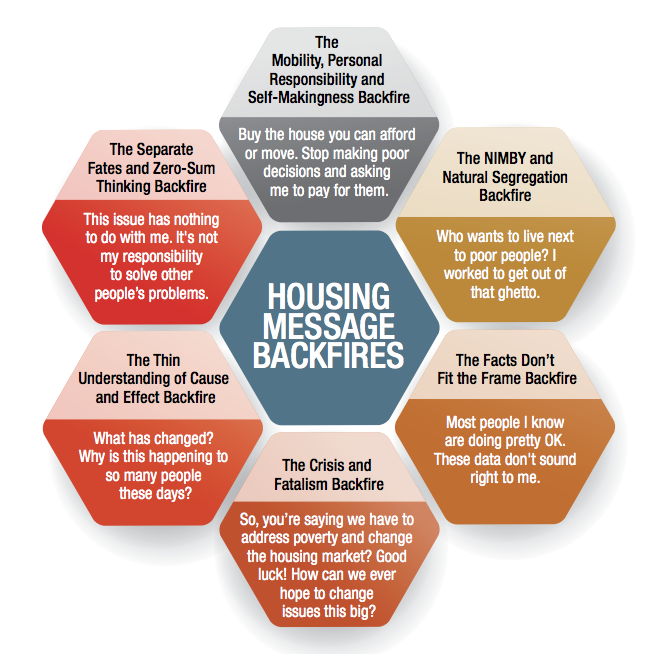Don't Let Your Message Backfire: Tips to Debunk Common Housing Myths
There is a strong and growing movement among housing advocates to advance policies and programs that ensure that all people have access to healthy and affordable housing. When it comes to building public support for this agenda, there is a lot of work to be done, though. While the housing and community development movement is growing, the public discussion seems to be stalled.
Broadening public thinking on housing issues, increasing support for necessary policies, and sparking action and engagement is more challenging than ever before. There is a general difficulty among the public to see housing as an issue that requires greater attention from policymakers. People struggle to see the connection between housing, equity and inclusive communities. Public support is necessary to enact policies and establish programs that promote equity and inclusion, and advocates face an uphill battle.
In this report, we lay out the challenges that advocates face and put forward evidence-based messaging recommendations that can be used to advance a strong affordable housing agenda. Our goal is to equip housing and community development advocates with evidence about which messages work (and which don’t). We share effective ways of sharing stories that expand the public discourse on housing issues—paving the way for real and lasting systems change.
Excerpts from the report:
For more than 30 years, cognitive and behavioral scientists have been studying the “backfire effect”—the phenomenon in which people become more entrenched in false beliefs when confronted with evidence that contradicts their views. Examples of housing message backfires:

Recommendation: Tell stories that balance the people, places and systems perspectives.
Advocates need to tell stories that position people, places AND systems as active characters. Adding place-based context, in particular, can help position housing challenges and their effects in alignment with where those challenges are occurring and where interventions might be usefully employed or targeted. Broadening our messaging in this way provides the public with needed practice in thinking about how places and systems, in addition to individual efforts, shape how well or poorly our communities function.
Recommendation: Tell a “Story of Us” rather than a “Story of Them.”
Widen the lens and tell a bigger story—one that makes it clear that housing issues have broader impacts for everybody. Values help people to see the solutions housing advocates pose as benefitting everybody (rather than “those people”). This values-based messaging allows us to tell a bigger story—a story about how housing affects all of “us” rather than a “story of them.”
Values can be especially important as housing advocates often need to gain support for policies and programs that are targeted to less influential constituents—people who are poor or homeless, people of color, seniors and others. Without values-based messaging, housing advocates will continue to face opposition because people have difficulty seeing their stake in our efforts to bring housing reforms.
Recommendation: Avoid leading with or over-relying on the terms “housing” or “affordable housing.”
Our research shows that people have problematic associations with the terms “housing” and “affordable housing.” When asked what “housing” meant to them, participants responded in ways that were structural and basic (e.g., housing is “four walls and roof”) or descriptive (e.g., housing is “a place to lay my head” or “a place to live”). It is more effective to talk about how much a “home” means to individuals or families than it is to talk about housing. Even better, provide examples of how deeply people are affected (in both positive and negative ways) by what surrounds them.
To learn more about why specific housing messages are backfiring and for additional insights about how to actively engage in efforts to build public will around housing, see the full 24 page report, “You Don’t Have To Live Here”: Why Housing Messages Are Backfiring and 10 Things We Can Do About It.
Dr. Tiffany Manuel will be a plenary speaker at ReFrame Conference 2019. Learn more about her sessions. She is the President & CEO of TheCaseMade, a public benefit corporation near Washington, DC that is dedicated to helping leaders powerfully and intentionally make the case for systems change. Dr. T. is passionate about increasing opportunities for public deliberation and public will-building around the issues of poverty, inequality and social exclusion. The Mercury News called her "a rock star in the affordable housing world."

